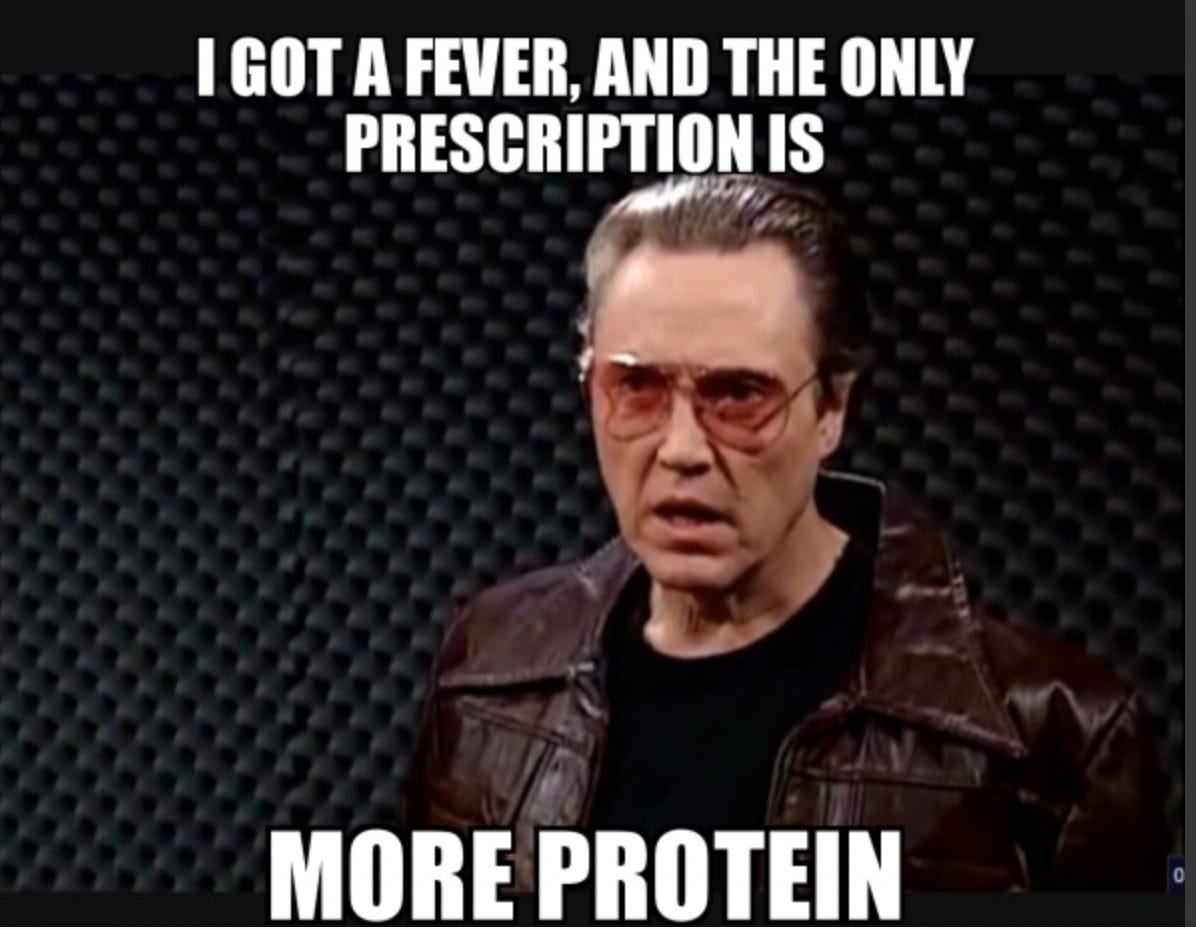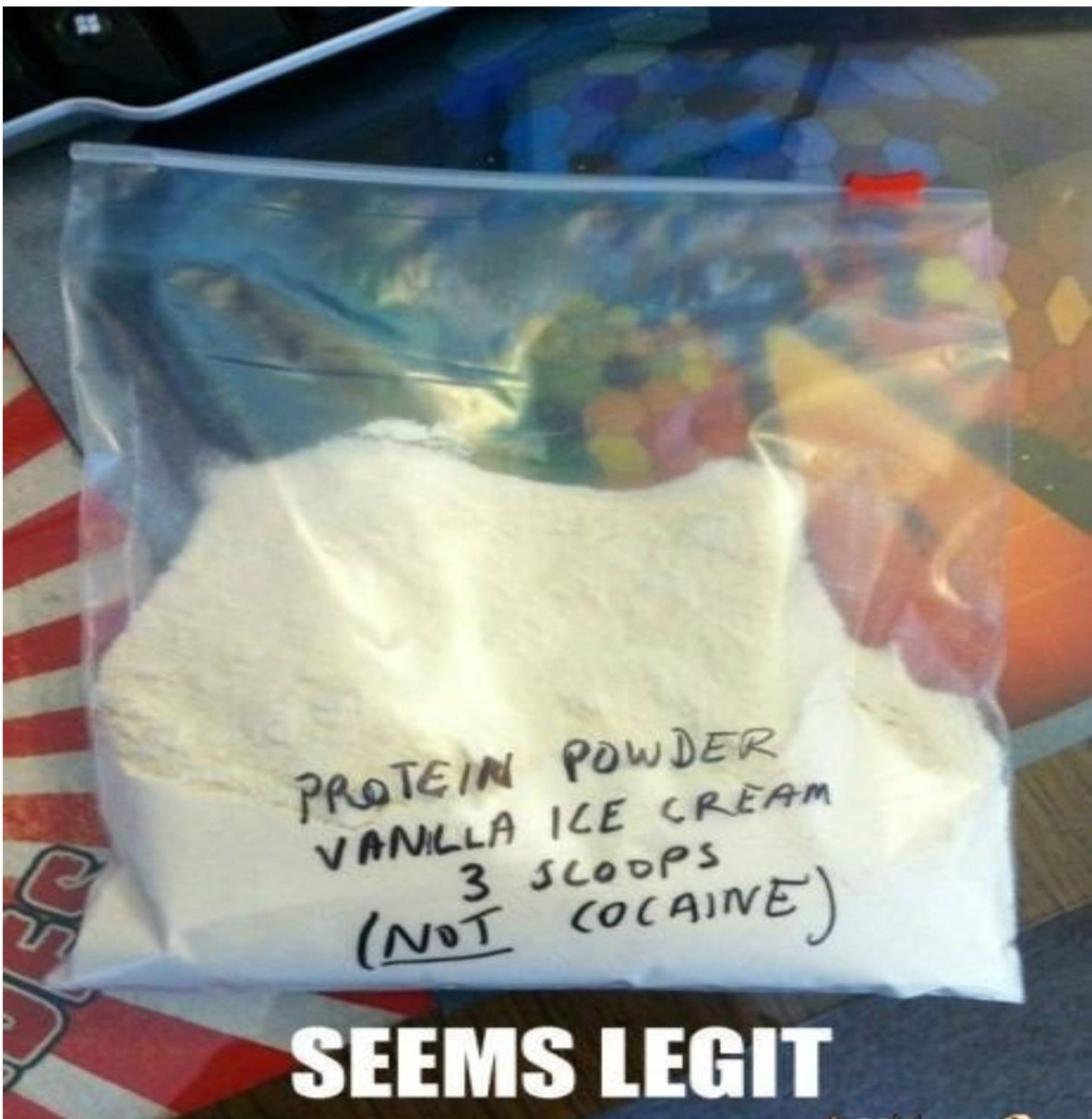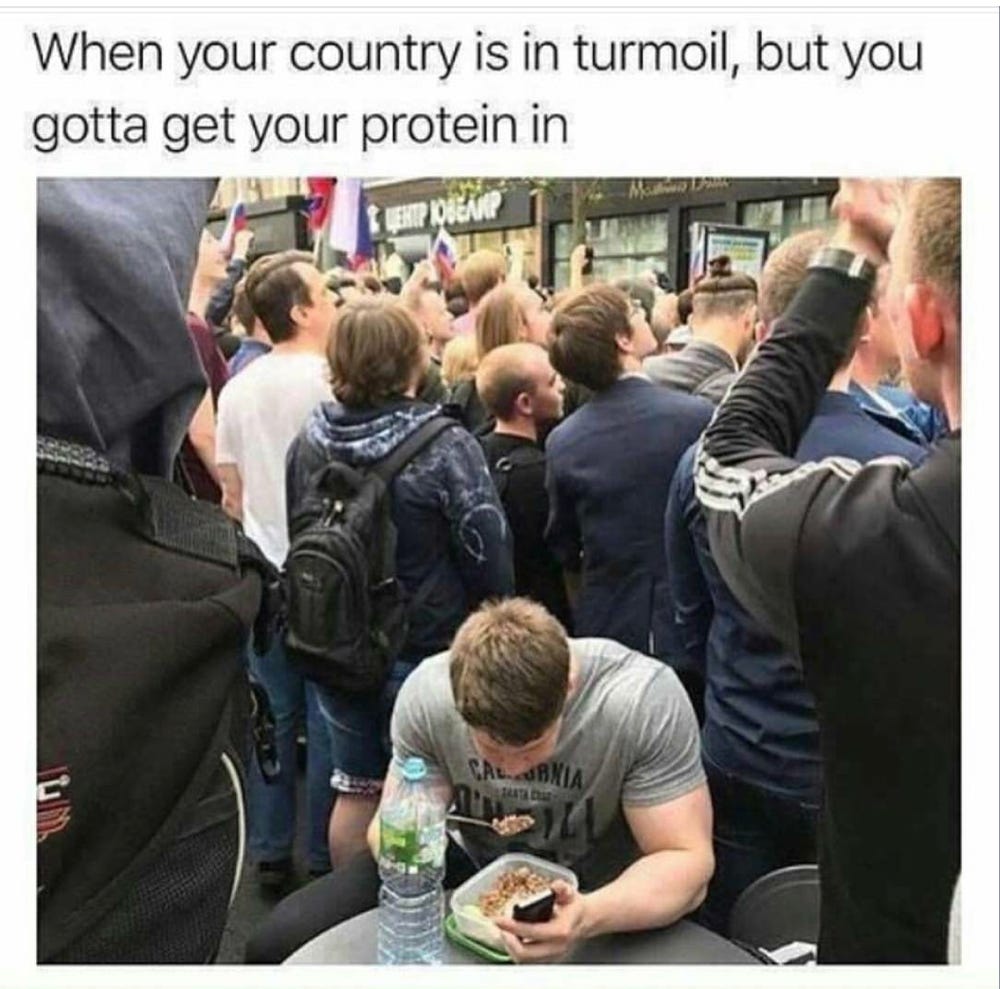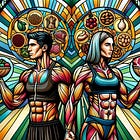Cut Cravings and Snacking Up To 60% Without Willpower or Suffering
Give your body what it needs and it won’t make you eat garbage!
There could be a simple solution, a reason, for cravings and snack attacks.
You might be protein-malnourished. Your body is searching for the nutrient it needs, but it can’t talk.
Experts tell us that if you increase your protein, you could cut your cravings by up to 60% and cut nighttime snacks by 50%. You’ll be able to lose weight easier, gain and maintain muscle mass, and age better.
But. You’re stranded in a dystopian Frankenfood experiment called Earth, where crazy corporate bosses think it’s okay to give you ultra-processed, low-quality “food,” steal your money, and take away your birthday.
Like most things in life, you’re on your own. You need to prioritize your own health, because no one is going to do it for you.
If you want to be healthy, you need to take a real look at what you put in your face. Listen to the nutrition experts out there. You need more protein, and you need it every day, or you won’t be operating at full capacity, mentally or physically.
“Whoa, Tim! Isn’t protein bad for mah kidneys? I don’t want to blow out mah kidneys!”
Valid concern. We’ve all heard this. But the myth has been busted. Here’s a quote from McMaster University:
“It’s a concept that’s been around for at least 50 years and you hear it all the time: higher protein diets cause kidney disease. The fact is, however, that there’s just no evidence to support this hypothesis. In fact, the evidence shows the contrary is true: higher protein increases, not decreases, kidney function,” — Stuart Phillips, Professor of Kinesiology, McMaster University
So there you go, bucko. Stop worrying about yer kidneys.
“But, Tim, the Gluconeogenesis? Won’t excess protein turn to sugar? What about the Gluconeogenesis?”
Gluconeogenesis is a natural mechanism that your body uses all the time. The whole “it turns to sugar” thing is partially true — we all do this every day, and it’s nothing to be afraid of. It isn’t something that you’re going to “turn on.” If Gluconeogenesis weren’t working, we would most likely be very sick, it’s one of the many checks and balances your body uses. Here’s a great discussion on it at Perfect Keto.
Now that you know you aren’t going to blow out your kidneys or turn all that protein into sugar, here are five scientific reasons why you should add more protein to your diet ASAP.
1. Getting Enough Protein Reduces Your Appetite and Lowers Total Calorie Intake
Protein is the most filling macronutrient. If you get enough of that, you’ll be less likely to go after the cookies, ice cream, and low-quality carbs. You’ll need less actual food to feel full!
This study found that “There is convincing evidence that a higher protein intake increases thermogenesis and satiety compared to diets of lower protein content.”
Another study (here) increased protein intake from 15% to 30% of calories in overweight women. They found that the ladies ended up eating 441 less calories on average per day, automatically, without changing anything else!
Go back and read that again.
So. Eat more protein, and you will eat less of other things. Bring on that steak or omelette. It sounds like a win-win scenario to me!
2. Getting Enough Protein Short Circuits the Binge and Food Addiction Pathways
I’m a recovered binge eater who knows all about this one. You can read Binge Eating Made Me Want To Kill Myself, and find out how I was feeling suicidal because I couldn’t stop my binging. I was at my lowest point because I couldn’t stop eating massive amounts of junk food.
After struggling on my own in silence, i knew it was get help or end it all.
I hired a health coach, and she got me out of danger. In a few short weeks, the binging slowed down and I stopped craving junk. It felt like a miracle. The demon was gone!
Experts tell us that increasing your protein intake can reduce cravings and nighttime snacking up to 60%.
Do you want to know how she tricked me into not eating up to three fast food meals and several candy bars in one sitting?
She upped my protein intake early in the day. Then she got me to eat a few veggies. There was a lot more to it, like goal setting, accountability, emotional digging, and crying. But changing my food inputs gave me the chance to do all of that work by removing the cravings.
You can read scientific stuff about that here, here, and here.
3. Get Stronger, Grow Muscles, and Keep Muscle Mass
Your body is made out of protein. If you work out, you want to get stronger, and that takes adequate protein intake.
But people aren’t eating even close to enough. You’re a people, so I mean YOU probably aren’t eating nearly enough.
And if you’re over 40, or trying to lose weight, you need EVEN MORE protein to ensure you don’t lose muscle mass.
Don’t take my word for this. Listen to someone like Cynthia Thurlow, a nurse practitioner, nutrition and intermittent fasting expert, and two-time TEDx speaker.
Here is a full interview with Cynthia Thurlow on KetoKamp Podcast. She talked specifically about this at [14:00] What’s the Importance of Protein to Aging and Metabolic Health?
4. Protein Increases Fat Burning Metabolism
Eating a higher amount of protein and fat than carbs can help your body switch to fat-burning instead of sugar-burning.
This is what you want! It’s a good way to reduce body fat.
Of course, you could go the other way and eat mostly carbohydrates like bread, sugar, fries, and pasta. This is a good way to release a ton of insulin and store all that fat.
The bottom line is that you CANNOT lose weight when your body releases a massive spike of insulin. It’s nearly impossible because insulin only lets you store weight.
So, if fat loss is your goal, it’s a no-brainer. Eat less carbs. And what can you make up the difference with? High-quality protein and fat.
This doesn’t even take into account the thermic effect of protein, which requires more energy to break down. Basically, your body has to work a little harder to use up protein than it does to use those highly processed carbs.
According to this study, protein has a higher thermic effect than fat or carbs — 20–35% compared to 5–15%.
5. Protein Helps Aging People Stay Fit
Studies like this one show that "Overall diet quality among adults aged 51 years and older needs improvement, and dietary protein intakes are falling below the current recommendation level.”
And that is only to meet the current recommendation level, which we already know is too low.
There are four obvious ways to age well.
Exercise enough that you don’t become a sad sack of floppy, fat, couch-covering human-shaped weakness. Even long walks could be enough to keep you from expiring early.
Eat food that contains all the nutrients your body needs for repair and growth. Unless you want your body to be made out of spindly things like lettuce and floppy junk like pasta, you need to give it what it’s begging for: Protein.
Get enough sleep for that repair and growth. The human body needs almost as much downtime as uptime.
Avoid poison. This list includes seed or vegetable oils, sugar, ultra-processed carbohydrates, Frankenfoods, hateful relationships, and politics.
Eating enough protein is number two on this aging well list. Number 2!
How’s your protein? Let me know in the comments.
Bonus Resources for Paid Members of Time2Thrive:









Awesome Tim! All true. I went to school later in life to get my dietetic technician degree. The 'standard' RDA for protein intake is 0.8-1.0g of protein per kg of bodyweight. The Harvard Medical School even says this is 'modest'!. For building muscle or recovery from illness, that range is upped. But, as you cite, there are many reasons for that to be more-over 50, aging, not losing muscle, reducing belly fat, weight loss - are the reasons this year, I've been consciously aiming for 1.3g PRO/kg of my bodyweight. Increased protein intake with some carb cycling has really helped me. Thanks for a great article!
I was vegan for a while, but noticed that once I included eggs and chicken again, I had a lot more energy. I got really bad food poisoning from crab cakes a couple of years ago and have been afraid to eat seafood ever since. I don't have lots of cravings, except occasionally for salty foods.